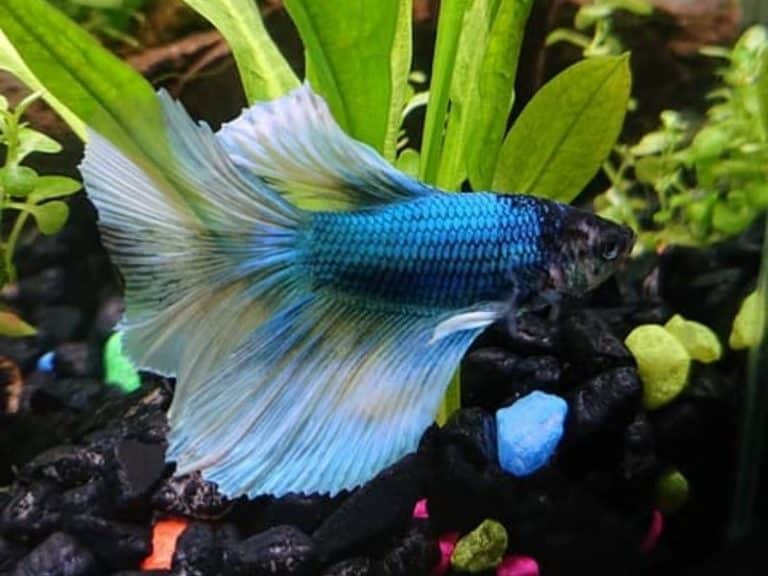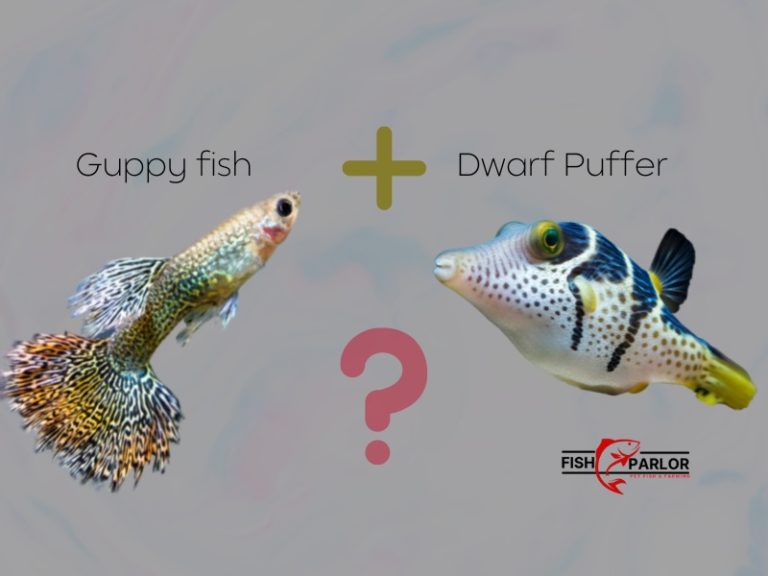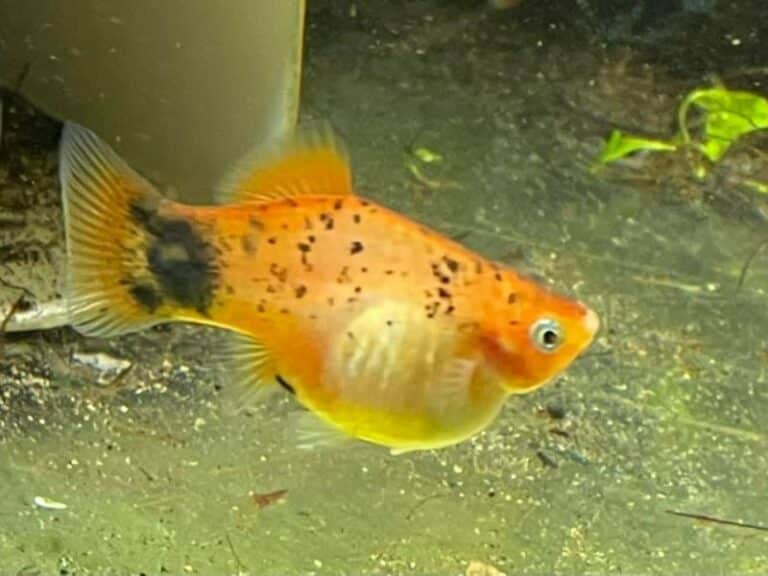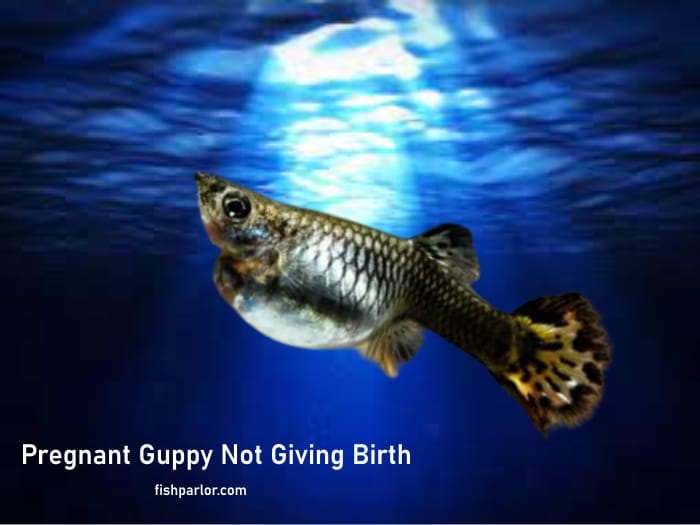When you find your goldfish and guppy breathing fast, do not remove them from their environment. Transferring the fish to a new water chemistry environment might cause more problems. But what causes your fish to breathe fast?
There are several reasons why your goldfish and guppies could be breathing fast: moving the fish from one aquarium to another, unexpected traffic near the aquarium, increase and decrease in water temperature, and ammonia in the water. Any of these factors can cause rapid breathing in goldfish and guppy fish.
What is hyperventilation in fish?
Hyperventilation in fish is basically rapid breathing that occurs when fish is exposed to elevated carbon dioxide levels in the aquarium. It is characterized by visibly fast-breathing. When the water has a high level of CO2, the oxygen supply is lowered and the fish builds up carbon oxide in the body.
The carbon dioxide build-up increases metabolism and lowers the activity of fish in your aquarium. Hyperventilated fish are characterized by slow growth, sluggish movement, and poor reproduction.
What makes goldfish and guppies breath fast?
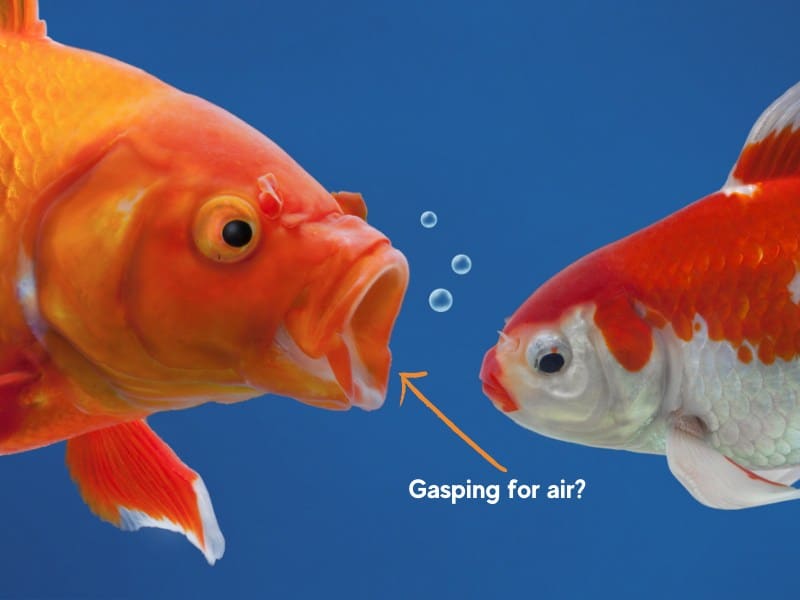
I enjoy watching my goldfish and guppies moving effortlessly, eating actively, and playing inside the fish tank. But what happens when they start breathing fast? It was terrifying the first time that happened to my guppies and goldfish. Their operculum was moving fast. I thought the fish would die from asphyxiation.
Here are some reasons why goldfish and guppies breathe fast:
Insufficient amount of oxygen in the tank
Insufficient oxygen concentration in the water is one of the common reasons why fish might be breathing faster than usual. Like all aquatic animals, guppies and goldfish need significant oxygen to survive.
Guppies are primarily active at the center of a fish tank. On the other hand, goldfish move in all parts of the tank. If your fish are settling at the top or bottom of the tank most of the time and breathing faster, it might be due to a lack of enough oxygen in the water.
If oxygen is in short supply, the fish can also lay around, eat less, and play less.
Presence of ammonia inside the water
Ammonia is a dangerous compound that occurs from accumulated leftovers in the aquarium. It also occurs due to the decomposition of organic matter and fish droppings. When ammonia is formed inside the fish tank, it damages the gills of your fish including goldfish and guppies, resulting in rapid breathing.
The gills struggle to absorb oxygen from the ammonia solution. Your guppies and goldfish will breathe fast to maximize oxygen inside their respiratory system.
The most common causes of ammonia inside the aquarium are leftovers from previous fish feeding, using tap water in your aquarium, and putting the wrong type of plant inside the fish tank.
A goldfish affected by ammonia will have a lilac or red gill and tends to lose appetite.
Change of environment and disturbance
When fish are transported from one aquarium to another without proper acclimatization, they may experience unfavorable conditions and may start to breathe fast as an adaptation for survival.
The new aquarium has different water chemistry from the fish source. Guppies and goldfish will notice the slightest change in water pH, nitrate levels, and temperature. The change may stress your goldfish or guppies and alter their breathing.
High traffic in the house
Aquarium fish also breathe fast due to external disturbance. When there is high traffic of people at your home and more so near the aquarium, the fish will sense an unconducive environment. The fear and anxiety from frequent disturbances cause rapid breathing in fish.
Harassment and aggression
Some fish, like betta fish, are aggressive and can easily chase around other fish in the aquarium. Harassment in your aquarium can also cause rapid breathing and gasping for air due to increased activity from swimming too fast around the aquarium.
If aggression is the main reason for hyperventilation in your aquarium, you want to increase your tank size, add plenty of live plants, driftwood and other hiding places in the aquarium. Also, a bigger tank can reduce territorial problems in the aquarium.
Illnesses
Ammonia poisoning and aquatic parasites like aquarium mites cause illnesses in fish. Goldfish and guppies can also breathe fast when they are sick. Illnesses such as Ichthyophthirius multifiliis can change your fish’s color and make them sluggish and reluctant.
If you notice such changes in your aquarium, consult with your area’s aquarium extension officer. If you don’t take care of the aquarium illnesses as soon as possible, the damage to your fish’s gills could be irreversible. That would eventually result in the sudden death of fish in the aquarium.
Overcrowding
Overcrowding your guppies and goldfish will cause a shortage of oxygen in the aquarium. All the fish will be competing for enough oxygen that the water can provide. Overcrowding also results in excess fish waste and ammonia in the water. The decline in oxygen due to overcrowding raises the breathing rate of goldfish and guppies significantly.
Unsuitable water temperature
Water temperature plays a crucial role inside an aquarium. Warm water contains less amount of oxygen than cold water. Very high temperatures lower oxygen circulation in the water. Therefore, hot temperatures will cause the fish to breathe fast as they try to cool themselves and compensate for the low oxygen levels. The fish will, however, breathe with significant difficulty.
Do not let the water become too cold either. Although cold water does not cause heavy breathing in goldfish and guppies, it can lower their metabolism and inactive your fish. The goldfish may also swim on their sides when the water has poor temperature.
How to fix and stop rapid breathing in fish
When you find your fish breathing heavily, stay calm and assess the root cause of the rapid breathing.
If your goldfish and guppies are breathing fast, here is how to fix the situation.
Use an aquarium filter to improve oxygen circulation
If you notice heavy breathing in your guppies and goldfish, the best remedy is to use an aquarium filter to improve oxygen circulation in the fish tank. Change 50% of your aquarium water with fresh water every week if you don’t have a filter. Increased freshwater will bring in fresh air and oxygen to relieve your fish from breathing fast.
Using an aquarium filter and weekly water changes will improve oxygen circulation in the water and make your fish happy and active.
Keep ammonia and nitrate levels at zero
Ammonia poisoning can cause death to the fish in less than five hours. Use a nitrate meter and an ammonia test strip kit to measure nitrate and ammonia levels in your tank. In the aquarium, even less than ten ppm of ammonia and nitrate will suffocate and kill your guppies and goldfish.
Ensure to clean the fish tank two or three days a month to promote air filtration. Most importantly, avoid overfeeding the fish so that there are no leftovers. Feed your guppies enough food to finish in less than one minute.
Put your fish in a bigger tank
When the fish experience rapid breathing due to overcrowding, it’s best to improve the size of the aquarium. A larger tank has sufficient dissolved oxygen. It allows goldfish and guppy fish to move freely and have enough oxygen supply in the tanks.
If the fish tank you are currently using is overcrowded, you can also buy a larger one. Ensure at least one gallon of water for every one inch of fish.
Add guppy grass, java fern, and moss balls to your aquarium
It’s good to create an optimal environment for fish, just like their natural habitats. But before you decide on the type of plants to submerge inside the aquarium, research it to ensure it does not emit poisonous compounds like ammonia and nitrates.
The correct aquarium plants also aid in the removal of carbon dioxide. Plants such as bamboo release poisonous gases that will harm the fish’s gills and cause death to your fish. Fix goldfish and guppy fast breathing by submerging plants like guppy grass, java fern, and moss balls in your aquarium.
Keep water temperature between 68˚F and 74˚F
Water temperature is crucial for fish. You have to regulate it to give guppies and goldfish the correct amount of oxygen and keep them from freezing. If the room temperature is high, it will also affect the aquarium water temperature. Use a glass thermometer to find out and regulate your aquarium water temperature.
When the temperature is low, raise it using an aquarium heater. The size of the heater should be proportional to your tank size. Regulating the water temperature will save your goldfish and guppy fish from asphyxiation and restore their breathing.
Avoid traffic and disturbances near the aquarium
Fish also senses danger and changes in their environment. Heavy traffic and external disturbances near your aquarium frighten fish and fills them with anxiety. As a result, your goldfish and guppies could breathe fast. Place the aquarium away from people whenever you have a party or visitors at home.
Guppies and goldfish are low-maintenance fish. If you notice rapid breathing in the fish, analyze the cause and deal with it quickly.
References
- Aquarium Info. (2015). Planting your aquarium.
- Ern, R., & Esbaugh, A. J. (2016). Hyperventilation and blood acid-base balance in hypercapnia exposed red drum (Sciaenops ocellatus). Journal of Comparative Physiology B, 186(4), 447-460.

